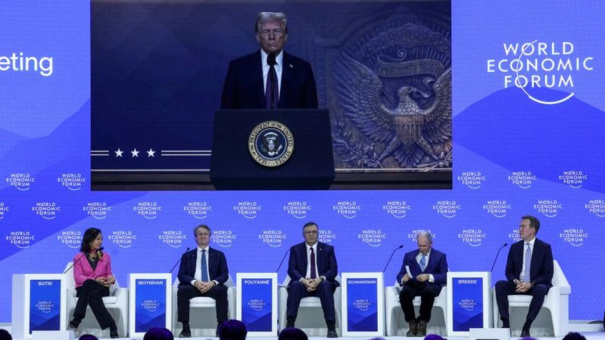Davos 2025
Source : katehon.com – 27 janvier 2025
https://katehon.com/en/article/davos-2025
Abonnez-vous au canal Telegram Strategika pour ne rien rater de notre actualité
Pour nous soutenir commandez les livres Strategika : “Globalisme et dépopulation” , « La guerre des USA contre l’Europe » et « Société ouverte contre Eurasie »
The World Economic Forum (WEF) held its annual Davos Summit last week, which brought together some of the world’s wealthiest and most influential people. Almost all of the participants are liberal-globalists, with the notable exception of Trump, who videoed to give a speech and answer a few questions from the panel. To remind everyone, WEF Chairman Klaus Schwab is infamous for exploiting the COVID-19 pandemic to advance his vision for a “Fourth Industrial Revolution”/“Great Reset”.
Many world leaders and their underlings were also discovered to be taking their cues from Schwab and the WEF, with some even using the exact same language as they were, which led to an explosion in interest in him and his organization. Considering its power and influence as proven during the pandemic, it’s worthwhile following its annual summit to see whether the participants reveal anything about the liberal-globalists’ forthcoming plans, such as how they might respond to Trump’s return to office.
UN Secretary-General Antonio Guterres spent most of his brief speech warning about the threats posed by climate change and ungoverned artificial intelligence (AI). It’s worth recalling that Trump pulled the US out of the Paris Agreement for the second time on his first day back in office and then announced a $500 billion AI investment the day after. Guterres’ speech therefore suggested that the UN will pressure him on these issues, albeit to no avail since he isn’t influenced by them and actually detests them.
President of the European Commission Ursula von der Leyen also touched on climate change and AI just like Guterres did, but in the larger context of reviewing the past quarter-century and forecasting what might soon be to come. She lamented the return of global trade barriers of the sort that Trump is known for favoring while declaring that the EU will rise to these challenges and others over the next half-decade through a green and tech investment plan called the “Competitiveness Compass”.
She also said that the “European Savings and Investment Union” will complement the aforesaid and spoke about her plans to remove existing barriers within the European single market. Another plan involves removing barriers to the EU’s energy union as part of the effort to complete the bloc’s diversification from Russian resources and promote green energy. Von der Leyen also envisages rebalancing the EU’s trade and investment ties with China so that they’re more mutually beneficial.
The same goes for the US, which she said provides twice as many digital services to the EU as the EU provides to the US, not to mention supplying a whopping 50% of its LNG. The overall gist of her speech is that the EU will continue consolidating as a united geopolitical entity amidst China’s rise and the US’ efforts to restore its unipolar hegemony. What she didn’t talk about, however, is the bloc’s lack of strategic autonomy vis-à-vis the US that’s been on full display over the past three years.
Chinese Vice-Premier Ding Xuexiang was another powerful person who participated in last week’s event. He referenced President Xi Jinping’s speech eight years ago and the need to keep economic globalization on track due to the mutual benefits that he claimed that everyone derives from these processes. Accordingly, he condemned protectionism and preached the importance of multilateralism while praising the UN in mild swipes at Trump, who he didn’t refer to by name in his speech.
Other subjects that he talked about include climate change and tech, just like Guterres and von der Leyen brought up in their speeches, and ways in which China can bridge the North-South divide on them. Ding referenced President Xi’s Global Development, Security, and Civilization Initiatives in connection with this to explain the leading role that the People’s Republic sees itself playing in these regards. He also touched upon his country’s fiscal and monetary policies to promote its economic attractiveness.
From Ding’s speech, it’s clear that China will resist Trump’s protectionist and hegemonic plans by doing its utmost to defend economic globalization, which is responsible for its superpower rise in recent years. When paired with von der Leyen’s, it’s possible that China and the EU will cooperate more on this, though a lot will depend on whether the bloc is able to restore some of its strategic autonomy. Trump is expected to more muscularly contain China so he wouldn’t approve of the EU working closer with it.
It wouldn’t be an international event without Zelensky participating since he always finds a way to involve himself in anything of importance taking place across the world, with the exceptions being non-Western events like BRICS and the SCO as well as 2023’s G20 Summit in Delhi, where he wasn’t invited. He took this latest opportunity to urge Europe “to compete for the top spot in priorities, alliances and technological development” on the basis that it can no longer fully depend on the US.
In pursuit of that, he predictably fearmongered about Russia and the possibility of Trump cutting a deal with it behind the EU’s back, the consequences of which he suggested could be mitigated if key countries like France, Germany, Italy, and the UK combined their military forces with Ukraine’s to counter Russia. That’ll make Europe stronger, he claimed, and could be advanced by spending 5% of GDP on defense like Trump demands. Zelensky also proposed a joint EU-Ukrainian air defense program too.
According to him, only comprehensive security cooperation with Ukraine can ensure that Europe becomes strong, which is why he urged them to provide his country with “real security guarantees”. Reflecting on his words, he’s clearly worried that Trump will coerce him into making what Kiev considers to be unacceptable concessions to Russia, which is why he wants the EU to have his back. They’re unlikely to act unilaterally though since they require American approval for any major initiatives.
Dispatching conventional troops to Ukraine, for example, risks provoking a hot war between them and Russia. Trump doesn’t want that to happen since it could drag the US in and thus distract from his ambitious agenda, which is why he probably won’t agree to extend Article 5 mutual defense guarantees to any NATO members’ troops that are sent to third countries like Ukraine without American approval. Zelensky’s lofty plans will therefore almost certainly amount to nothing as usual.
The speeches from the preceding figures and other comparatively less significant ones preceded Trump’s keynote video appearance. He began by describing his domestic agenda that aims to reduce debt and inflation through more responsible fiscal policies and tariffs. It’ll also attract more foreign investment per his explicitly stated theme that “America is back and open for business.” He correspondingly threatened that companies will have to pay higher tariffs if they don’t make their products in America.
This can be interpreted as him throwing down the gauntlet against the EU and China by aggressively promoting more protectionist measures in defiance of their shared goal to promote economic globalization. He also condemned the “Green New Deal” by calling it the “Green New Scam”, promised to drill for more oil and gas at home, and committed to building more power plants in order to turn the US into “the world capital of artificial intelligence and crypto.”
Other highlights include calling on OPEC to lower the oil price, which will lead to dropping interest rates if it happens as well as supposedly depriving Russia of the budgetary revenue that it requires to continue its special operation in Ukraine, thus swiftly ending the conflict in his opinion. Trump also boasted about his new border security policy, ending government censorship of the sort that the EU and China engage in, and restoring meritocracy. All this and more represented direct challenges to the liberal-globalists.
Unlike during his first term, Trump has already gotten a lot done in the span of just several days during his second one through the hundreds of Executive Orders that he signed, which even CNN admitted seemed like a full term’s worth of achievements thus far. That’s because he, his advisors, and those who he just appointed to the government spent the past four years learning from the mistakes and shortcomings of his first term in order to ensure that this second one will be much more successful.
The WEF’s participants were all aware of this by the time he videoed in to give his speech and answer a few questions from the panel on Thursday afternoon so they’re expected to take him much more seriously than before. They know that he’s back with a vengeance, believes that “I was saved by God to make America great again” as he claimed in his inauguration speech, and that he’ll therefore be much more difficult to subvert at home and abroad than last time.
Even so, they’ll still try to stop him, though their odds aren’t in their favor as much as before. While China is still a formidable systemic competitor to the US, the EU is no longer the semi-independent actor that it once seemed to be after the US reasserted its previously declining unipolar hegemony over it since 2022. The EU’s economy was hit very hard by the energy sanctions against Russia that the US pressured the bloc to implement and is thus much more vulnerable to his tariff threats than last time.
The EU with the exception of Hungary and Slovakia has also convinced itself that it needs the US to protect it from Russia so it’s not expected to take any drastic unilateral action against American interests out of fear that Trump might curtail the US’ role in NATO in response. While many might be receptive to Zelensky’s self-interested and manipulative call for the EU to become stronger by investing more in its defense, the truth is that it can’t make up for decades of lost time right away.
Von der Leyen’s green and tech plans might lead to more friction in transatlantic ties, but it’s unclear how far the EU will go in this regard considering that it’s the US’ junior partner nowadays, and the bloc might capitulate to Trump’s threats to tariff it if these policies are implemented at the expense of US interests. Likewise, the same goes for expanding cooperation with China, which will occur under the shadow of America’s restored unipolar hegemony over Europe. Nothing dramatic is therefore expected.
As for China, it won’t give up hope of turning the EU against the US, to which end it might offer some concessions on trade and investment. Even if these plans don’t lead to anything significant, ties will likely remain stable in all respects due to their complex mutual interdependence, which will impede any effort by Trump to “decouple” these two no matter how hard he tries. He might thus settle for keeping EU-Chinese relations at their present level but taking action to prevent their further strengthening.
Chinese-US ties will depend much more on the outcome of the trade war that Trump is expected to intensify, America’s continued arming of Taiwan, and the possibility of clashes in the South and East China Seas between China and US-allied claimants to those waters than on EU-Chinese ties. These factors will shape the global systemic transition upon the end of the Ukrainian Conflict, whenever it’ll happen and regardless of its terms, as Trump “Pivots (back) to Asia” to more muscularly contain China.
On that topic, it remains unclear exactly what Trump’s peace plan is, but he’s already signaled that more anti-Russian sanctions could follow President Putin’s possible rejection of whatever offer he makes. His claims shortly after the inauguration about how Putin is “destroying Russia”, the alleged impact of the existing sanctions regime on its economy, and how Russia supposedly lost almost one million troops suggest that he’s being misled by his advisors. This bodes ill for the possibility of a pragmatic peace plan.
Steven Bannon even warned that Ukraine risks becoming Trump’s Vietnam if he doesn’t quickly end the conflict like he promised on the campaign trail and raised the alarm about how the defense industry, the Europeans, and misguided advisors might manipulate him into perpetuating hostilities. That’s exactly what the liberal-globalists want so he’s advised to listen to that MAGA thought leader otherwise his ambitious agenda would be derailed.
Altogether, this year’s Davos Summit didn’t shed much light on how the liberal-globalists plan to obstruct Trump’s efforts to deal a deathblow to the world order that they created, which suggests that they were either truly caught flat-footed by his return to office or they might have something up their sleeve. In any case, Trump is much more focused than during his first term so it’ll be much more difficult for them to subvert his domestic and foreign agendas, thus raising the chances that they might not resist too much.
To be sure, some of them will try to stop him, but they’ll be operating in completely different conditions than last time, so the only one with any chance of posing serious obstacles to him is China and that’s solely because it’s the US’ systemic competitor. Unless Trump is tricked into perpetuating the Ukrainian Conflict, and it remains to be seen whether that’ll happen like Bannon just warned is possible, then he’ll probably achieve a lot of what he aims to do at home and with Europe.
The outcome of the US’ systemic struggle with China over the emerging world order will depend on factors – the predictably intensified trade war, continued American arms to Taiwan, and regional tensions over the South and East China Seas – that can’t yet be forecast with a high degree of certainty. Correspondingly, the most important variable is whether and how he ends the Ukrainian Conflict, which itself is largely dependent on the extent to which he purges his “deep state” of subversive elements.
He’s on a roll so far after the past week saw him accomplish what seemed to be a full term’s worth of achievements according to CNN, but it’s too early to say whether this means that his aforementioned purge was successfully completed or if these subversive elements still exist and are plotting a comeback. As cliché as it sounds, time will tell, but for now it appears as though Trump has much better prospects of implementing his ambitious agenda no matter what Davos’ liberal-globalists might try to do.




